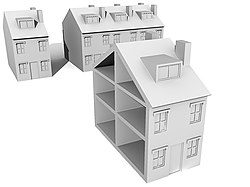| Property law |
|---|
 |
| Part of the common law series |
| Types |
| Acquisition |
| Estates in land |
| Conveyancing |
| Future use control |
| Nonpossessory interest |
| Related topics |
| Other common law areas |
|
Higher category: Law and Common law |

In English common law, real property, real estate, immovable property or, solely in the US and Canada, realty, refers to parcels of land and any associated structures which are the property of a person. For a structure (also called an improvement or fixture) to be considered part of the real property, it must be integrated with or affixed to the land. This includes crops, buildings, machinery, wells, dams, ponds, mines, canals, and roads. The term is historic, arising from the now-discontinued form of action, which distinguished between real property disputes and personal property disputes. Personal property, or personalty, was, and continues to be, all property that is not real property.
In countries with personal ownership of real property, civil law protects the status of real property in real-estate markets, where estate agents work in the market of buying and selling real estate. Scottish civil law calls real property heritable property, and in French-based law, it is called immobilier ("immovable property").